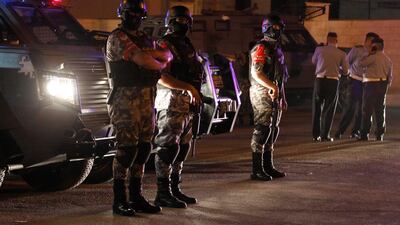A security guard shot and killed two Jordanians at Israel’s embassy in Amman in a "confrontation", Israel's foreign ministry said.
Earlier reports said that one person had died and two — including one Israeli — were injured in Sunday's incident in a residential building used by embassy staff.
The ministry says two Jordanian workmen entered the building to replace furniture. One of the workers allegedly attacked an Israeli guard with a screwdriver.
Israeli media say the guard opened fire, killing a 17-year-old Jordanian. The reports also say that a Jordanian man, owner of the apartment, was hit by gunfire inadvertently and later died.
The media reports say Jordan demands to conduct an investigation, and that embassy staff remain inside the embassy.
Opinion: The fog of Al Aqsa violence obscures the true face of Israel's occupation
The Israeli statement said that according to international conventions, the guard has legal immunity.
"The first Jordanian, 17-year-old Mohammed Jawawdeh, succumbed to his injuries at the scene. The second, Bashar Hamarneh, a doctor who was in the residential quarter of the embassy at the time of the incident … died of his injuries after midnight in hospital," a security source said.
The injured Israeli is "deputy director of security at the Israeli embassy and is still receiving treatment in hospital", the source added.
Police said in a statement they were "informed late evening [on Sunday] of a shooting at a residential building inside the compound of the Israeli embassy".
Police deployed to the scene and surrounded the area, the statement said, adding that the two Jordanians had gone into the building to carry out "carpentry work".
An investigation into the shooting was still underway, the police said.
Israel and Jordan are bound by a 1994 peace treaty, but tensions have been high in recent days after Israel put in place security measures at a highly sensitive holy site in annexed east Jerusalem.
On Friday, thousands of Jordanians took to the streets of Amman after the weekly prayer to denounce the Israeli measures at the Haram Al Sharif mosque compound, known to Jews as Temple Mount.
Read more: Abbas confirms halt to security coordination with Israel over Al Aqsa
Jordan is the official custodian of Muslim holy sites in Jerusalem.
A crowd estimated at more than 8,000 turned out for a demonstration called by Islamist movements and leftist parties.
Israel shut off the mosque compound on July 14 after Arab Israelis attacked and killed two police officers nearby.
Violence flared between Israeli security forces and Palestinians who are demanding that Israel remove metal detectors installed outside the site after the attack.

